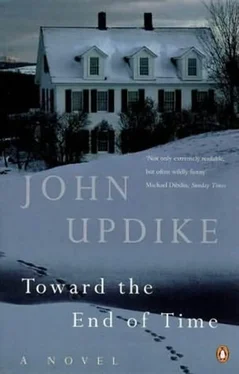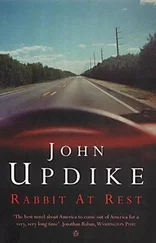John Updike - Toward the End of Time
Здесь есть возможность читать онлайн «John Updike - Toward the End of Time» весь текст электронной книги совершенно бесплатно (целиком полную версию без сокращений). В некоторых случаях можно слушать аудио, скачать через торрент в формате fb2 и присутствует краткое содержание. Жанр: Современная проза, на английском языке. Описание произведения, (предисловие) а так же отзывы посетителей доступны на портале библиотеки ЛибКат.
- Название:Toward the End of Time
- Автор:
- Жанр:
- Год:неизвестен
- ISBN:нет данных
- Рейтинг книги:3 / 5. Голосов: 1
-
Избранное:Добавить в избранное
- Отзывы:
-
Ваша оценка:
- 60
- 1
- 2
- 3
- 4
- 5
Toward the End of Time: краткое содержание, описание и аннотация
Предлагаем к чтению аннотацию, описание, краткое содержание или предисловие (зависит от того, что написал сам автор книги «Toward the End of Time»). Если вы не нашли необходимую информацию о книге — напишите в комментариях, мы постараемся отыскать её.
Toward the End of Time — читать онлайн бесплатно полную книгу (весь текст) целиком
Ниже представлен текст книги, разбитый по страницам. Система сохранения места последней прочитанной страницы, позволяет с удобством читать онлайн бесплатно книгу «Toward the End of Time», без необходимости каждый раз заново искать на чём Вы остановились. Поставьте закладку, и сможете в любой момент перейти на страницу, на которой закончили чтение.
Интервал:
Закладка:
The sarcasm escaped them. They looked at me mutely. They were not Americans of direct African descent but distinctly dusky. Portuguese and Spanish blood had in some nocturnal tropical byway swerved to add a Negro tinge to olive skin. Distrustful brown faces, with black eyes as lustrous and vulnerable and angry as Deirdre’s or the gelatinous orb that gazed back at me from the gliding train window last winter.
I restated my question: “Are you aware that this is private property?” They had begun to build something, with no tools other than one rusty hammer, a coffee can full of nails, and a hacksaw pitifully ill-suited to cutting wood. It was hard to guess, from the few branches they had aligned and insecurely fastened together, what kind of structure was intended, here on a slightly raised knoll of land amid the creased granite boulders.
“Who say?” one-the tallest-asked in turn.
“I fear that I say,” I said. “These eleven acres are mine. If you doubt me, let’s go together and call the police.” Our little local downtown, with a blue-sided public telephone beside the convenience store, was not many steps away, across the railroad tracks. Haskells Crossing, our village is called; every crossing, on the B & M line between Gloucester and Boston, was named in the old days, and some of the names stuck, though the old Haskell estate has long been broken up into two-acre house lots. These boys had followed the tracks north, to a better life.
Another of them snickered, but was enough uncertain of the decorum of the encounter to avert his face, so that he directed at the leafing forest floor his mumbly reply: “Yeah you do that. You go find them, mister. They just love to come runnin’, those police do.”
The older, bigger one felt sufficiently on firm ground to offer a proposal. He spoke carefully. “We just want to make a little place here in case it rains.”
“A little cozy place,” the other speaker said. He was trying, I gauged, to match my initial tone of sarcasm. He was the nimble-witted lawyer of the group.
I was feeling ownership of this spot sliding out from under me. I looked at the third boy, the darkest and most slender; he seemed not much older than Kevin, and not as tall. “There is nothing cozy about this place,” I stated firmly to him. “From this time of year on, there are tons of insects. There is poison ivy and scratchy briars. At night there are bats.” My sense of it was they were city boys, out of Salem or Lynn but not all the way from Boston. “A few years ago,” I told them, “there were rabid raccoons; one bite would kill you.” Saying all this to the youngest gave me the courage to face the biggest and say in a voice artificially level, “I suggest you get off my land now.” My hand at my side did itch for a gun, even that borrowed.22 with which I had beheaded the chickadee fifty years ago.
He said, expressionlessly, a surprising thing in reply: “Phil say you pay him rent.”
“Phil? You know Phil?” I was as relieved as if Phil were a dear friend, to have a connection established between these youths and the adult world.
The little lawyer, as if not wanting his client to speak for himself, interposed, “My older sister, she know Deirdre. She told her the land all empty.”
“It is not empty,” I said. “I own it.” I shifted my ground, perhaps disastrously. “There’s lots of empty land, since the war.” I was conceding an abstract squatters’ rights, to entice them to go elsewhere.
“Less lately,” the leader told me, with his deadpan facticity. His lips seemed stung and numbed by the words he was forced to utter. “Less now than there used to be. People movin’ around.”
The youngest one, whom I had appealed to as an image of my touching, grateful grandson, with a sudden wide wave of one thin and limber arm gave a pronouncement almost poetic: “All these trees and dead rocks, they’re not doin’ anybody any good.”
“They’re doing me good,” I told him in a grandpaternal tone. “Me and my wife. They’re part of our living space.”
My tone, or this curious term, made the lawyer of the group snicker again, and then as if to cover up this lapse he pleaded, his widening eyes focused on my face and daring me to look away, “We was thinkin’ just a little watchin’ post for the summer. Cold weather come, nobody can use it, promise.”
“Watching post? What would you watch?” This was my instinctive reply, but a wrong one. I should have instantly rebuffed the seasonal inroad. I was rusty at haggling.
The older one smiled, or at least his blunt, numb appraisal of me and my potential as an obstacle softened. “A lot of stuff goin’ on” was his answer.
“He means pedestrian traffic,” the lawyer said. “You may not know it, man, but tons of people use this path as a way to the water. We’d be doin’ you a favor. We’d be keepin’ people from gettin’ up to your house.”
“All these favors for free?” I asked-another mistake, a sarcasm taken as a concession.
“You said it,” the spokesman eagerly agreed, his eyes staying fixed on my face in a kind of shining impudence. “No charge, absolute protection. We’ll be makin’ the place more tidy, too. Cleanin’ up all this crap.”
It was an area which I visited, as my physical activities became more restricted, no more than once or twice a year. When we first moved here, Gloria and I walked to the beach every week and roamed the woods stacking brush and planning bonfires. No more: this site was mine only by law. A litter of beer cans and plastic soda bottles had built up.
The leader reached down and picked up the hammer. In his plump olive fist it became a weapon. He said to me stolidly, “You ask Deirdre and Phil.”
“No,” I said, sounding prim and excited even in my own ears. “I will speak to my wife about this. And the police.”
“Uh-huh.” “Sure.” “You go do that, mister.” All had spoken, to reinforce one another; the three boys drifted closer together to make a dense unit that, by some force of anti-gravity, propelled me, my face hot with anger and fear, back up the hill. As I climbed the slope, which was slippery with dead needles, my heart labored and raced. Around me in the fresh leaves raindrops began to tick. Rain would chase the interlopers away, was my cowardly consolation.
But I did not, yesterday, describe the incident to Gloria. I did not want her to know more about Deirdre than she had already guessed. The house was healing. Even the useless old coffee-maker that had been stolen had reappeared in a lower kitchen cabinet, tucked behind the extra soup bowls. I did ask her, though, if she would like to borrow the shotgun back from the Pientas. I told her I had seen deer scat in the woods.

Now in the suburban streets where some kind of order is still maintained, and even in the yards of those houses which are abandoned and boarded up or else burned-out shells, the vibrant magenta of crabapple outshouts the milder pink of flowering cherry, the dusky tint of redbud, and the diffident, sideways-drifting clouds of floating dogwood petals. The stunted old apple to the right of the driveway, much topped to keep it from intruding on the view, puts forth a scattered show of thin-skinned white tinged with pink, like an English child’s complexion. The lilac racemes, once tiny dry cones the color of dead grapeskins, are turning large and soft and pale. Nearer to the house, the fattening azalea buds are bright as candy hearts.
However luxuriantly the crabapples down in the village are blooming, there is one in our side yard, toward the Kellys’, that is half dead. Gloria, in a dictatorial whirl restoring the order that I had let, in her absence, slide, asked me to cut it down. “Give it a chance,” I pleaded.
Читать дальшеИнтервал:
Закладка:
Похожие книги на «Toward the End of Time»
Представляем Вашему вниманию похожие книги на «Toward the End of Time» списком для выбора. Мы отобрали схожую по названию и смыслу литературу в надежде предоставить читателям больше вариантов отыскать новые, интересные, ещё непрочитанные произведения.
Обсуждение, отзывы о книге «Toward the End of Time» и просто собственные мнения читателей. Оставьте ваши комментарии, напишите, что Вы думаете о произведении, его смысле или главных героях. Укажите что конкретно понравилось, а что нет, и почему Вы так считаете.












